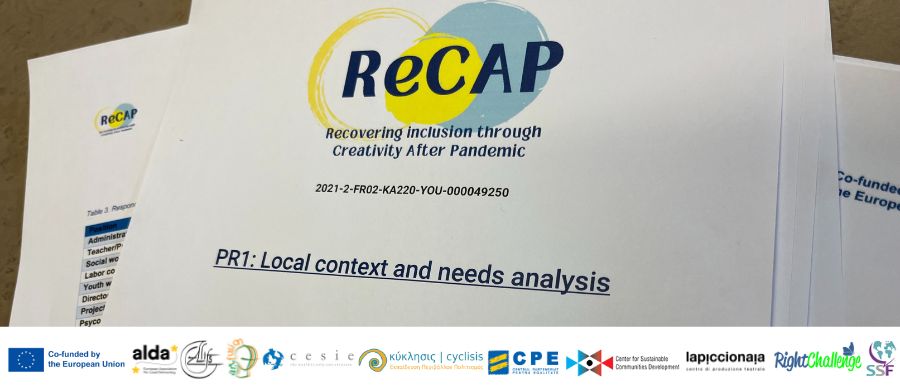The first result of the ReCAP project has been successfully completed!
In the framework of the Project Result 1, the final report elaborated by the project partner, Solidaridad Sin Fronteras, with the contribution of all partners, aims to draw a picture of the post pandemic local contexts addressed, collecting the specific needs of young people from the point of view of professionals working with youth. The report is now available in English and it will soon be accessible in other 7 languages.
Through desk research and a detailed questionnaire, the ten project partners have investigated the social issues that the pandemic caused or worsened on young people. After having finalised it, the questionnaire was distributed among professionals working with youth and other relevant stakeholders from November 2022 to January 2023.
The research involved 124 professionals working with vulnerable young people, with the following distribution: Bulgaria (25), France (22), Italy (21), Romania (19), Portugal (18), Spain (10) and Greece (9). Most of them are women (69%) between 25 and 34 years old. In a previous phase, partners identified the stakeholders to address the questionnaire, in order to cover the main areas where stakeholders working with vulnerable youngsters can be found: municipal youth centres, educational centres, social work services, labour orientation services, security office, health centre, and others. According to data, the sector where the survey has been implemented the most is the educational sector, so it is over-represented and this has to be taken into account when looking at the overall results. The young population groups with whom these professionals work most often are: girls (39,67%), youth not in employment, education or training “NEET” (38,02%), youth with migrant background (33,88%), minorities (29,75%), youth from the LGBTIAQ+ community, youth with disabilities (3,30%) and minors in the penal system (1,65%).
Despite the disparities among the countries, some similarities can be found. The research shows that professionals working with youth are concerned about the negative effects of COVID-19 pandemic on psychological health and emotional well-being, and they pointed out the effects on socialisation, cultural life, studies and training. Results show that young people’s relationships within all the spheres of their lives have worsened, especially with the educational environment, with themselves and with the local community.
The Local Context and Needs Analysis Report draws a picture of the specific needs of young people in the post-pandemic period
Overall, the national results highlight that the services provision is now higher than before the pandemic, especially in Bulgaria and Greece, but with the exception of Italy. It is a general optimistic result that shows that the local services have probably adapted to the urgency of needs, and that highlights the resilience of the educational and social sector professionals. Young people seem to visit the services more often than before the pandemic, and they mostly need psychological and emotional health support and educational support. According to professionals, the use of psychological support is the most relevant tool to work with youngsters nowadays.
Moreover, the study reveals that most professionals consider artistic and cultural tools useful and motivating for youngsters, which is certainly an optimistic outcome that will ensure a positive uptake of the ReCAP project future tools.
Read the Report in English k fatt. 👈
🇧🇬 Read the Report in Bulgarian
🇵🇹 Read the Report in Portuguese
